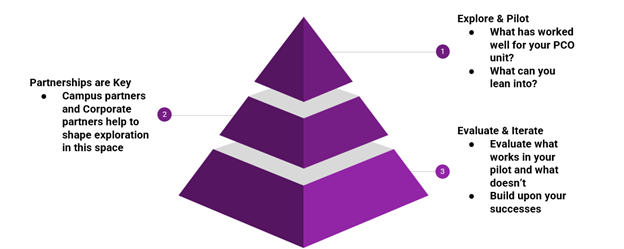Boiling the Ocean of Microcredentials

By Stacy Chiaramonte
As we start the New Year, I’ve been reflecting on the milestones and trends in 2023 and what stood out for me was the Convergence conference, based on both the high levels of interest (the inaugural event sold-out!), and the incredible buzz among attendees. There were so many conversations happening and great presentations by institutions that were in various phases of implementation. I was struck by a comment a colleague made on day two. She noted that most of our institutions are just beginning to figure out this space of alternative credentials, and then there are a handful that are going to “eat us for lunch”—a euphemism for having really built incredible alternative credential programming. This resonated with me because this has been my experience as well. I would argue that our online and professional education units have been doing alternative credentials for decades and that this shift to digital, on-demand content, badging, and new nomenclature is really an evolution of that work. We know how to develop and launch programs, yet many of us are struggling to know where to begin with these new credentials. I’m sure this conversation will continue throughout 2024, as more institutions expand their work in the non-degree credential space.
The UPCEA Research and Consulting team has been doing a significant amount of research in this space as well, including our recent work as part of a grant-funded project titled, “Building Capacity, Expanding Pathways: Accelerating the Growth of Credential Innovation in Higher Education.”
In this recent study of member institutions, Alternative Credentials: Business and Program Models, we learned from respondents that:
- 69% agree or strongly agree that senior leadership has embraced alternative credentials
- 52% have been offering alternative credentials for more than 5 years; yet
- 74% indicated that they do not know the net revenue generated by their microcredential programs
- Only 41% have a consistent process for pricing alternative credentials
I recently facilitated the UPCEA microcredential course, Credentials Beyond Degrees, and I learned a great deal from both preparing the course and working with my first group of students. So it was no surprise to see these data points from the survey. It seems that many institutions are exploring alternative credentials but have not yet figured out how to grow them. This has led me to writing this blog, with a goal of providing some guidance to those we are feeling a little bit overwhelmed about how to move forward.
First Things First
Define alternative/microcredentials at your institution. You must have a framework that serves as your guide as you develop programming and sets the standards for your institution. This will also help to set up stackable credentials that earn credit. In my previous experience at Worcester Polytechnic Institute, we formed a small working group of key stakeholders and one of our amazing Instructional Designers developed a working framework. That served as our guide for each program we developed. It is not yet fully ratified by Faculty, but we solicited Faculty input and have been consistent in following that structure in the development of all microcredentials.
In parallel, engage your key stakeholders, particularly your Registrar. There are many important stakeholders across your campus, but your Registrar may be the most critical. Often we avoid our Registrars because online and professional education units typically drive them crazy! However, your Registrar is your partner and the success of your credential programs depends on their support and alignment. The Registrar can help to structure your credential offerings, leveraging your student information system as much as possible, to allow for future stackability to credit. They can also help you to build buy-in with Faculty.
Pilot, Ideally with a Corporate Partner
I’ve talked with many institutions that are trying to dot every “i” and cross every “t” before they get started. We all know that higher education is not known for moving quickly and if we try to get every last detail in place, it can take years to get alternative credentials up and running. Try some pilot programs to test the waters and work through the operational details. Ideally, this would be with a corporate partner. This is a great way to get support and guidance from the employer perspective. Just 28% of survey respondents said they involve employers in program development very often or often. This is a missed opportunity! Those employers are the buyers of your alternative credentials and involving them in development ensures that the content aligns with their needs and they are invested in having their employees complete the program.
Be thoughtful about what programs your institution is known for and lean into those. If you build it, they will not come! Programs need to be responsive to market demand and something your target students think of you as an expert in. This is another reason corporate partners can be so helpful. They will tell you what they’d like to see from you. This is also why piloting is a good way to start. You can test the market for a program and if you find the demand isn’t there, you can pivot. I offer the visual below to help illustrate this idea.

Chiaramonte, S. (2023, November 1). “How Do You Boil the Ocean of Alternative Credentials? Our Approach: Piloting to Test the Waters.” Presented at Convergence: Credential Innovation in Higher Education, Washington, DC.
Know Your Business
This is one I cannot stress enough and is probably the biggest gap in most institutions. You need to understand what it costs to offer each microcredential and be thoughtful about how you are setting prices for them. This is not a high margin business. It is expensive to develop alternative credentials, market them, and enroll students. There are direct costs for technology, staff, development, marketing, and indirect costs for overhead and general support systems. Develop a simple model that will allow you to track your cost per program and consider that when you set pricing. Spend some time looking at competitors’ program pricing and take into account the program length, type of credential earned, etc. when setting the price. This can become a framework to guide you. For example, a program that is 20 hours of content and earns a badge should be priced higher than a two-hour program that earns a certificate of completion. And track your revenue generated by program. Again, this can be a simple tally of enrollments in a spreadsheet. It is worth the effort to do this work semi-manually if necessary. It is critical for you to evaluate the return on investment or ROI, for each credential by comparing the costs to the revenue generated.
Learn more about UPCEA's expert consultants.
Do you need help with your PCO unit or campus? We can help. Contact UPCEA Research and Consulting for a brief consult. Email [email protected] or call us at 202-659-3130.
Trusted by the nation's top colleges and universities, UPCEA Research and Consulting provides the best value in the industry today. UPCEA's industry experts have years of experience in Online and Professional Continuing education - put them to work for you!
UPCEA Research and Consulting offers a variety of custom research and consulting options through an outcomes-focused pricing model. Find the option(s) that best suit your institution.
Learn more about UPCEA Research & Consulting
The UPCEA Difference
Unmatched Experience: For more than 100 years, UPCEA consultants have exclusively served the needs of online and professional continuing education programs. UPCEA consultants leverage their extensive industry expertise to expedite solutions, anticipate upcoming shifts, and offer distinct best practices, effectively aiding clients in achieving their goals.
Cost Effectiveness: As a nonprofit, member-serving organization, we provide unmatched value, allowing you to maximize limited research and consulting budgets.
Action in Motion: Our cadre of experienced, skilled authorities and expert practitioners propels you forward, translating research and consulting into impactful implementation, a distinctive hallmark of UPCEA. Our team of current and former institutional leaders will support you, turning research and consulting into action.
Mission Alignment: Like you, our mission is to enhance and expand educational opportunities and outcomes for adult and other non-traditional learners. We share your values and work in partnership with you to advance access and excellence in education.
